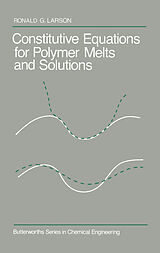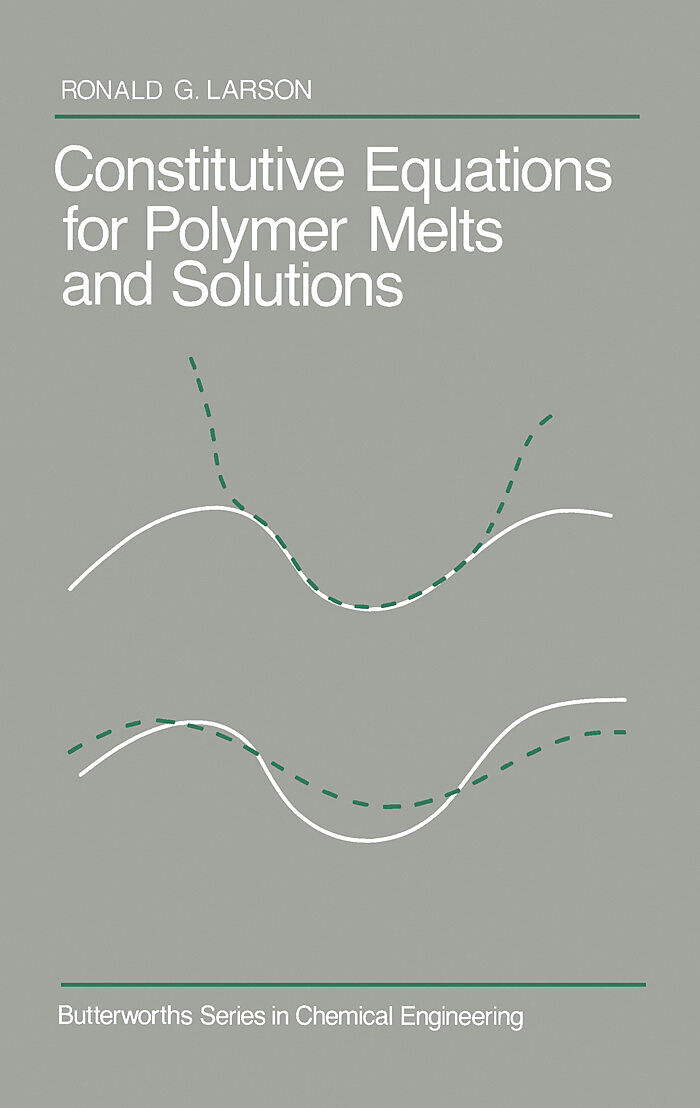Constitutive Equations for Polymer Melts and Solutions
Einband:
E-Book (pdf)
EAN:
9781483162867
Autor:
Ronald G. Larson
Herausgeber:
Elsevier Science & Techn.
Erscheinungsdatum:
22.10.2013
Constitutive Equations for Polymer Melts and Solutions presents a description of important constitutive equations for stress and birefringence in polymer melts, as well as in dilute and concentrated solutions of flexible and rigid polymers, and in liquid crystalline materials. The book serves as an introduction and guide to constitutive equations, and to molecular and phenomenological theories of polymer motion and flow. The chapters in the text discuss topics on the flow phenomena commonly associated with viscoelasticity; fundamental elementary models for understanding the rheology of melts, solutions of flexible polymers, and advanced constitutive equations; melts and concentrated solutions of flexible polymer; and the rheological properties of real liquid crystal polymers. Chemical engineers and physicists will find the text very useful.
Inhalt
Preface
Chapter 1. Introduction to Constitutive Equations for Viscoelastic Fluids
1.1 Introduction
1.2 Viscoelastic Flow Phenomena
Rod-Climbing
Extrudate Swell
Tubeless Siphon
Vortex Formation in Contraction Flows
Other Examples
1.3 Viscoelastic Measurements
Shear Thinning
Normal Stresses in Shear
Time-Dependent Viscosity
Stress Relaxation
Recoil
Sensitivity to Deformation Type
1.4 Deformation Gradient, Velocity Gradient, and Stress
The Deformation Gradient
The Velocity Gradient
The State-of-Stress Tensor
1.5 Relating Deformation and Stress
Viscoelastic Simple Fluids
The Newtonian Limit
The Elastic Limit
Frame Invariance
Examples of the Finger Tensor
Relationship Between the Finger tensor and the Velocity Gradient
1.6 A Simple Viscoelastic Constitutive Equation
Integral Version
Differential Version
Predictions
1.7 Summary
Chapter 2. Classical Molecular Models
2.1 Introduction
2.2 The Equilibrium State
Configuration Distribution Function
Polymer Chains as Hookean Springs
2.3 The Stress Tensor
Derivation from Spring Force
Derivation from Virtual Work
2.4 Rubber Elasticity Theory
2.5 The Temporary Network Model
Derivation of Constitutive Equation
Assumptions of the Green-Tobolsky Model
Successes and Limitations of the Green-Tobolsky Model
2.6 The Elastic Dumbbell Model
The Langevin Equation
The Smoluchowski Equation
The Constitutive Equation
2.7 The Rouse Model
The Langevin Equation
Normal Mode Transformation
The Stress Tensor and Constitutive Equation
Approximation for Slow Modes
Assumptions of the Rouse Model
2.8 Linear Viscoelasticity
Distribution of Relaxation Times
Time-Temperature Superposition
Nonlinear Superposition
2.9 Summary
Chapter 3. Continuum Theories
3.1 Introduction
3.2 The Constitutive Equation of Linear Viscoelasticity
Shear
Other Deformations
3.3 Frame Invariance
3.4 Oldroyd's Constitutive Equations
Convected Time Derivatives
Upper- and Lower-Convected Maxwell Equations
Oldroyd's Simple Equations
Corotational Maxwell Equation
3.5 The Kaye-BKZ Class of Equations
The Strain Energy Function
The History Integral
Shear
Time-Strain Separability
Lodge-Meissner Relationship
Other types of Deformation
3.6 Other Strain History Integrals
Wagner's First Equation
Superposition Integral Equation
Tanner-Simmons Equation
3.7 Summary
Chapter 4. Reptation Theories for Melts and Concentrated Solutions
4.1 Introduction
4.2 Simplifying Features of Melts
Chains in melts are ideal
No Hydrodynamic Interaction in Melts
Stress-Optic Law for Melts
4.3 Crossover to Entanglement Effects
Appearance of a Plateau Modulus
Meaning of the Plateau
4.4 The Doi-Edwards Constitutive Equation
Reptation
Nonlinear Modulus
The Probability Distribution Function
The Free Energy and the Stress Tensor
The Constitutive Equation
Premises of the Doi-Edwards Model
4.5 Approximations to the Doi-Edwards Equation
Currie's Potential
Larson's Potential
Approximation Based on the Seth Elastic Strain Measure
Differential Approximation
4.6 Predictions of Reptation Theories
Molecular-Weight Dependence
Relaxation Spectrum
Nonlinear Viscoelasticity
4.7 Curtiss-Bird Theory
4.8 Summary
Chapter 5. Constitutive Models with Nonaffine Motion
5.1 Introduction
5.2 Gordon-Schowalter Convected Derivative
The Stress Tensor
The Convected Derivative
5.3 Johnson-Segalman Model
Elastic Strain Measure
Predictions of the Johnson-Segalman Model
Forcing Corotation of Principal Stress and Strain Axes
Time-Strain Separability
5.4 Partially-Extending Convected Derivative
Shear Damping Function
Predictions in Steady Flows
Integral Equation
5.5 Irreversibility of Nonaffine Motion
Reversing Deformations
The Tube Picture
Differential Formulation of Irreversibility
5.6 White-Metzner Equation
Steady-State Flows
Sudden Deformations
5.7 Summary
Chapter 6. Nonseparable Constitutwe Models
6.1 Introduction
6.2 Giesekus and Leonov Models
Giesekus Model
Leonov Model
Predictions of the Leonov and Giesekus Models
6.3 Network Models
Yamamoto's Model
Phan-Thien/Tanner Model
Criticisms of the Phan-Thien/Tanner Model
Model of Acierno, La Mantis, Marrucci, and Titomanlio
Other Structural Models
General Network Model: Differential and Integral Form
The Equations of Bird and Carreau
6.4 Configuration Distribution Functions
Green-Tobolsky Network Model
Rouse-Zimm Dumbbell Model
Other Models
6.5 Summary
Chapter 7. Comparison of Constitutive Equations for Melts
7.1 Introduction
Considerations Affecting the Choice of Constitutive Equation
Approach Taken in this Chapter
7.2 The Relationship Between Integral and Differential Constitutive Equations
Network Integral Equations
Differential Analogs for Separable Kaye-BKZ Equations
Differential Analogs for Nonseparable Kaye-BKZ Equations
Comparison of Kaye-BKZ Equations with their Differential Analogs
Comparison of Separable and Nonseparable Differential Constitutive Equations
Alignment Strength versus Flow Strength
7.3 Comparing Constitutive Equations to Melt Data
Differential Constitutive Equations
Alignment Strength and the Damping Function
Constitutive Equations with a Dependence on Alignment Strength
7.4 Summary
Appendix
Chapter 8. Viscoelasticity of Dilute Polymer Solutions
8.1 Introduction
8.2 Linear Viscoelasticity
Rouse model
Hydrodynamic Interaction
High frequency Behavior
8.3 Non-Newtonian Viscosity
8.4 Expressions for the Stress Tensor
Kirkwood-Riseman Expression
Giesekus Expression
8.5 Dumbbells with Shear Thinning
Dumbbells with Hydrodynamic Interaction
Dumbbells with Excluded Volume
Dumbbells with Finite Extensibility

Leider konnten wir für diesen Artikel keine Preise ermitteln ...
billigbuch.ch sucht jetzt für Sie die besten Angebote ...
Die aktuellen Verkaufspreise von 6 Onlineshops werden in Realtime abgefragt.
Sie können das gewünschte Produkt anschliessend direkt beim Anbieter Ihrer Wahl bestellen.
Loading...
Die aktuellen Verkaufspreise von 6 Onlineshops werden in Realtime abgefragt.
Sie können das gewünschte Produkt anschliessend direkt beim Anbieter Ihrer Wahl bestellen.
| # | Onlineshop | Preis CHF | Versand CHF | Total CHF | ||
|---|---|---|---|---|---|---|
| 1 | Seller | 0.00 | 0.00 | 0.00 |
